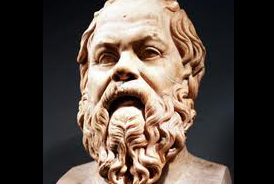Socrates was not a ‘philosopher,’ nor yet a ‘teacher,’ but rather an ‘educator,’ having for his function to rouse, persuade and rebuke (Plato, Apology).  Hence, in examining his life’s work it is proper to ask, not What was his philosophy’ but What was his theory, and what was his practice of education’ It is true that he was brought to his theory of education by the study of previous philosophies, and that his practice led to the Platonic revival; but to attribute to him philosophy, except in that loose sense in which philosophy is ascribed to one who, denying the existence of such a thing, can give an account of his disbelief, is misleading and even erroneous.
Hence, in examining his life’s work it is proper to ask, not What was his philosophy’ but What was his theory, and what was his practice of education’ It is true that he was brought to his theory of education by the study of previous philosophies, and that his practice led to the Platonic revival; but to attribute to him philosophy, except in that loose sense in which philosophy is ascribed to one who, denying the existence of such a thing, can give an account of his disbelief, is misleading and even erroneous.
Socrates’ theory of education had for its basis a profound and consistent skepticism; that is to say, he not only rejected the conflicting theories of the physicists, of whom ‘some conceived existence as a unity, others as a plurality; some affirmed perpetual motion, others perpetual rest; some declared becoming and perishing to be universal, others altogether denied such things, ‘but also condemned, as a futile attempt to transcend the limitations of human intelligence their, “pursuit of knowledge for its own sake.’
Unconsciously or more probably consciously, Socrates rested his skepticism upon the Protagorean doctrine that man is the measure of his own sensations and feelings; whence he inferred, not only that knowledge such as the philosophers had sought, certain knowledge of nature and its laws, was unattainable, but also that neither he nor any other person had authority to overbear the opinions of another, or power to convey instruction to one who had it not.
Accordingly, whereas Protagoras and others, abandoning physical speculation and coming forward as teachers of culture, claimed for themselves in this new field power to instruct and authority to dogmatize, Socrates, unable to reconcile himself to this inconsistency, proceeded with the investigation of principles until he found a resting place in the distinction between good and evil. While all opinions were equally true, of these opinions which were capable of being translated into act, he conceived, were as working hypotheses more serviceable than others. It was here that the function of such a one as himself began.
Though he had neither the right nor the power to force his opinions upon another, he might by a systematic interrogatory lead another to substitute a better opinion for a worse, just as a physician by appropriate remedies may enable his patient to substitute a healthy sense of taste for a morbid one. To administer such an interrogatory and thus to be the physician of souls was, Socrates thought, his divinely appointed duty; and, when he described himself as a ‘talker ‘or’ converser,’ he not only negatively distinguished himself from those who, whether philosophers or sophists, called themselves ‘teachers,” but also positively indicated the method of question and answer which he consistently preferred and habitually practiced.
That it was in this way that Socrates was brought to regard ‘dialectic,’ ‘question and answer,’ as the only admissible method of education is no matter of mere conjecture. In the review of theories of knowledge which has come down to us in Plato’s Theaetetus mention is made of certain ‘incomplete Protagoreans,’ who held that, while all opinions are equally true, one opinion is better than another, and that the ‘wise man’ is one who by his arguments causes good opinions to take the place of bad ones, thus reforming the soul of the individual or the laws of a state by a process similar to that of the physician or the farmer; and these ‘incomplete Protagoreans’ are identified with Socrates and the Socratics by their insistence upon the characteristically Socratic distinction between disputation and dialectic, as well as by other familiar traits of Socratic converse. In fact, this passage becomes intelligible and significant if it is supposed to refer to the historical Socrates; and by teaching us to regard him as an ‘incomplete Protagorean’ it supplies the link which connects his philosophical skepticism with his dialectical theory of education. It is no doubt possible that Socrates was unaware of the closeness of his relationship to Protagoras; but the fact, once stated, hardly admits of question.
In the application of the ‘ dialectical’ method two processes are distinguishable: the destructive process, by which the worse opinion was eradicated, and the constructive process, by which the better opinion was induced. It was not mere ‘ignorance ‘ with which Socrates had to contend, but ‘ignorance mistaking itself for knowledge’ or ‘false conceit of wisdom,’ a more stubborn and a more formidable foe, who safe so long as he remained in his entrenchments, must be drawn from them, circumvented, and surprised. Accordingly, taking his departure from some apparently remote principle or proposition to which, the respondent yielded a ready assent, Socrates would draw from it an unexpected but undeniable consequence which was plainly inconsistent with the opinion impugned.
In this way he brought his interlocutor to pass judgment upon himself, and reduced him to a state of doubt or perplexity. ‘Before I ever met you,’ says Meno in the dialogue which Plato called by his name, I was told that you spent your time in doubting and leading others to doubt; and it is a fact that your witcheries and spells have brought me to that condition; you are like the torpedo: as it benumbs any one who approaches and touches it, so do you. For myself, my soul and my tongue are benumbed, so that I have no answer to give you.’
Even if as often happened, the respondent baffled and disgusted by the destructive process, at this point withdrew from the inquiry, he had, in Socrates’ judgment, gained something; for, whereas formerly, being ignorant, he had supposed himself to have knowledge, now, being ignorant, he was in some sort conscious of his ignorance, and accordingly would be for the future more circumspect in action. If, however, having been thus convinced of ignorance, the respondent did not shrink from a new effort, Socrates was ready to aid him by further questions of a suggestive sort.
Consistent thinking with a view to consistent action being the end of the inquiry, Socrates would direct the respondent’s attention to instances analogous to that in hand, and so lead him to frame for himself a generalization from which the passions and the prejudices of the moment were, as far as might be, excluded. In this Constructive process, though the element of surprise was no longer necessary, the interrogative form was studiously preserved, because it secured at each step the conscious and responsible assent of the learner.
Of the two processes of the dialectical method, the destructive process attracted the more attention, both in consequence of its novelty and because many of those who willingly or unwillingly submitted to it stopped short at the stage of ‘perplexity.’ But to Socrates and his intimates the constructive process was the proper and necessary sequel. It is true that in the dialogues of Plato the destructive process is not always, or even often, followed by construction, and that in the Memorabilia of Xenophon construction is not always, or even often, preceded by the destructive process. There is, however, in this nothing surprising. On the one hand, Xenophon, having for his principal purpose the defense of his master against vulgar calumny, seeks to show by effective examples the excellence of his positive teaching, and accordingly is not careful to distinguish, still less to emphasize, the negative procedure. On the other hand, Plato, his aim being not so much ‘to preserve Socrates’ positive teaching as rather by written words to stimulate the reader to self-scrutiny, just as the spoken words of the master had stimulated the hearer, is compelled by the very nature of his task to keep the constructive element in the background, and, where Socrates would have drawn an unmistakable conclusion, to confine himself to enigmatical hints.
For example, when we compare Xenophon’s Memorabilia, with Plato’s Euthypliro, we note that, while in the former the interlocutor is led by a few suggestive questions to define ‘piety’ as ‘the knowledge of those laws which are concerned with the gods,’ in the latter, though on a further scrutiny it appears that ‘piety ‘is’ ‘ that part of justice which is concerned with the service of the gods,’ the conversation is ostensibly inconclusive. In short, Xenophon, a mere reporter of Socrates’ conversations, gives the results’, but troubles himself little about the steps which led to them; Plato, who in early manhood was an educator of the Socratic type, withholds the results that he may secure the advantages of the stimulus.
What, then, were the positive conclusions to which Socrates carried his hearers, and how were those positive conclusions obtained’ Turning to Xenophon for an answer to Induction these questions, we note (1) that the recorded conversations are concerned with practical action, political, definition, moral, or artistic; (2) that in general there is a process from the known to the unknown through a generalization, expressed or implied; (3) that the generalizations are sometimes rules of conduct, justified by examination of known instances, sometimes definitions similarly established.
Thus in Memorabilia, Socrates argues from the known instances of horses and dogs that, the best natures stand most in need of training, and then applies the generalization to the instance and discussion of men; and he leads his interlocutor to a definition of ‘the good citizen,’ and then uses it to decide between two citizens for whom respectively superiority is claimed. Now in the former of these cases the process which Aristotle would describe as ‘example ‘ and a modern might regard as ‘induction’ of an uncritical sort sufficiently explains itself. The conclusion is a provisional assurance that in the particular matter in hand a certain course of action is, or is not, to be adopted.
But it is necessary to say a word of explanation about the latter case, in which, the generalization being a definition, that is to say, a declaration that to a given term the interlocutor attaches in general, a specified meaning, the conclusion is a provisional assurance that the interlocutor may, or may not, without falling into inconsistency, apply the term in question to a certain person or act.
Moral error, Socrates conceived, is largely due to the misapplication of general terms, which, once affixed to a person or to an act, possibly in a moment of passion or prejudice, too often stand in the way of sober and careful reflection. It was in order to exclude error of this sort that Socrates insisted upon its basis. By requiring a definition and the reference to it of the act or person in question, he sought to secure in the individual at any rate consistency of thought, and in so far, consistency of action. Accordingly he spent his life in seeking and helping others to seek ‘the what’ or the definition, of the various words by which the moral quality to actions is described, valuing the results thus obtained not as contributions to knowledge, but as means to right action in the multifarious relations of life.
While Socrates sought neither knowledge, which in the strict sense of the word he held to be unattainable, nor yet, except as a means to right action, true opinion, the results of observation accumulated until they formed, not perhaps a system of ethics, but at any rate a body of ethical doctrine. Himself blessed with a will so powerful that it moved almost without friction, he fell into the error of ignoring its operations, and was thus led to regard knowledge as the sole condition of well doing. Where there is knowledge, that is to say, practical wisdom, the only knowledge which he recognized, right action, he conceived, follows of itself; for no one knowingly prefers what is evil; and, if there are cases in which men seem to act against knowledge, the inference to be drawn is, not that knowledge and wrongdoing are compatible, but that in the cases in question the supposed knowledge was after all ignorance.
Virtue, then, is knowledge, knowledge at once of end and of means, irresistibly realizing itself in act. Whence it follows that the several virtues which are commonly distinguished are essentially one. Piety, justice, courage and temperance are the names which wisdom bears in different spheres of action: to be pious is to know what is due to the gods; to be just is to know what is due to men; to be courageous is to know what is to be feared and what is not; to be temperate is to know how to use what is good and avoid what is evil. Further, in as much as virtue is knowledge, it can be acquired by education and training, though it is certain that one’s soul has by nature a greater aptitude than another for such acquisition.
But, if virtue is knowledge, what has this knowledge for its object’ To this question Socrates replies, Its object is the Good. What, then, is the Good’ It is the useful, the advantageous. Utility, the immediate utility of the individual, thus Theory becomes the measure of conduct and the foundation the Good of all moral rule and legal enactment. Accordingly, each precept of which Socrates delivers himself is recommended that obedience to it will promote the comfort, the advancement, the well being of the individual; and Prodicus’ apologue of the Choice of Heracles, with its commonplace offers of worldly reward, is accepted as an adequate statement of the motives of virtuous action.
Of the graver difficulties of ethical theory Socrates has no conception, having, as ft would seem, so perfectly absorbed, the lessons of what Plato calls political virtue, that morality has become with him a second nature, and the scrutiny of its credentials from an external standpoint has ceased to be possible. His theory is indeed so little systematic that, whereas, as has been seen, virtue or wisdom has the Good for its object, he sometimes identifies the Good, with virtue or wisdom, thus falling into the error which Plato perhaps with distinct reference to Socrates, ascribes to certain cultivated thinkers. In short, the ethical theory of Socrates, like the rest of his teaching, is by confession unscientific; it is the statement of the convictions of a remarkable nature, which statement emerges in the course of an appeal to the individual to study consistency in the interpretation of traditional rules of conduct.








































